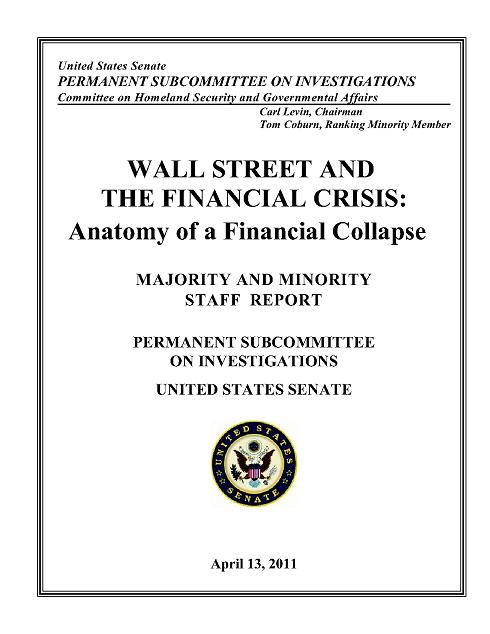Matt Taibbi, who continues a grueling one-man campaign against Goldman Sachs in the popular press, reports in the latest Rolling Stone on the newly released Levin Report, Wall Street and the Financial Crisis: Anatomy of a Financial Collapse, by the Senate Subcommittee on Investigations, chaired by Democrat Carl Levin of Michigan and Republican Tom Coburn of Oklahoma.
A sample:
To fully grasp the case against Goldman, one first needs to understand that the financial crime wave described in the Levin report came on the heels of a decades-long lobbying campaign by Goldman and other titans of Wall Street, who pleaded over and over for the right to regulate themselves.
Before that campaign, banks were closely monitored by a host of federal regulators, including the Office of the Comptroller of the Currency, the FDIC and the Office of Thrift Supervision. These agencies had examiners poring over loans and other transactions, probing for behavior that might put depositors or the system at risk. When the examiners found illegal or suspicious behavior, they built cases and referred them to criminal authorities like the Justice Department.
* * * *
But beginning in the mid-Nineties, when former Goldman co-chairman Bob Rubin served as Bill Clinton’s senior economic-policy adviser, the government began moving toward a regulatory system that relied almost exclusively on voluntary compliance by the banks. Old-school criminal referrals disappeared down the chute of history along with floppy disks and scripted television entertainment. In 1995, according to an independent study, banking regulators filed 1,837 referrals. During the height of the financial crisis, between 2007 and 2010, they averaged just 72 a year.
But spiking almost all criminal referrals wasn’t enough for Wall Street. In 2004, in an extraordinary sequence of regulatory rollbacks that helped pave the way for the financial crisis, the top five investment banks — Goldman, Merrill Lynch, Morgan Stanley, Lehman Brothers and Bear Stearns — persuaded the government to create a new, voluntary approach to regulation called Consolidated Supervised Entities. CSE was the soft touch to end all soft touches. Here is how the SEC’s inspector general described the program’s regulatory army: “The Office of CSE Inspections has only two staff in Washington and five staff in the New York regional office.”
* * * *
Goldman and the other banks argued that they didn’t need government supervision for a very simple reason: Rooting out corruption and fraud was in their own self-interest. In the event of financial wrongdoing, they insisted, they would do their civic duty and protect the markets. But in late 2006, well before many of the other players on Wall Street realized what was going on, the top dogs at Goldman. . .started to fear they were sitting on a time bomb of billions in toxic assets. Yet instead of sounding the alarm, the very first thing Goldman did was tell no one. And the second thing it did was figure out a way to make money on the knowledge by screwing its own clients. So not only did Goldman throw a full-blown “bite me” on its own self-righteous horseshit about “internal risk management,” it more or less instantly sped way beyond inaction straight into craven manipulation.
“This is the dog that didn’t bark,” says Eliot Spitzer, who tangled with Goldman during his years as New York’s attorney general. “Their whole political argument for a decade was ‘Leave us alone, trust us to regulate ourselves.’ They not only abdicated that responsibility, they affirmatively traded against the entire market.”
“They affirmatively traded against the entire market.” That’s the case against Goldman Sachs: fraud on an unimaginable scale, selling their clients what they knew to be toxic assets, and then betting on the failure of those assets, which not only contributed to the collapse of the financial market, but allowed Goldman to enrich itself as a result. It is as revolting as it is frightening. And, if anything, the company has come out of it more powerful than ever: too big to fail and too rich to prosecute.


A Pox on all their houses.